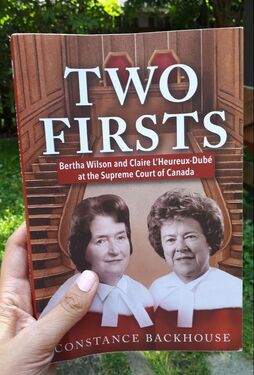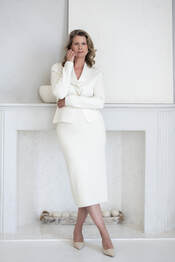 I loved Professor Backhouse’s biography of Justice L’Heureux-Dubé, so when I saw her book “Two Firsts: Bertha Wilson and Claire L’Heureux-Dubé at the Supreme Court of Canada” I knew I would enjoy it as well. “Two Firsts” is a lot shorter than the 1000-page biography of Justice L’Heureux-Dubé and much of “Two Firsts” that discusses L’Heureux-Dubé’s life and career was already covered in the biography. However, what I enjoyed about this new book was the insight into Justice Wilson’s career and rise to the top court and how it compared/contrasted with Justice L’Heureux-Dubé’s. Professor Backhouse eloquently tells the story of these two trailblazing women, juxtaposing their personal histories and career progressions. Wilson was Scottish born, married to a church minister, and was a research lawyer at a large corporate law firm in Toronto before being appointed to the bench. She was described by those who knew her as a “stoic Scot” who “stuck to her work”. While L’Heureux-Dubé, a Quebecoise who practiced family law, was described as having a “reputation as a femme fatale, whose flamboyance dominated every room she entered”.[1] While these women had different personal and professional lives, both were subjected to similar sexism and discrimination that arose due to their position as the “firsts”. They were isolated, left out, and “enveloped in a chilly climate that signalled disrespect”. Often their response was to downplay or ignore what was going on. At the Court of Appeal for Quebec, a judicial colleague named Fred, whom L’Heureux-Dubé liked and admired, gave her a “quick slap on the buttocks” “in a gesture apparently meant to be playful”. When the other judges cried out “Fred, you’ll be sued!”, L’Heureux-Dubé just laughed and said, “Oh, it’s so nice. Oh, Fred…I miss it.” Years later she added, “I was the only one. I was not going to alienate everybody there.”[2] When a fellow judge pulled out a chair for Justice Wilson on her first day in court at the Court of Appeal for Ontario, she “put up her index finger and said, ‘Don’t you ever do that again.’ The front row …all Queen’s Counsel, just broke right out laughing”. The chair-pulling judge emphasized that Wilson was ultimately “a great sport about it”.[3] In addition to reviewing the reception these women had as the “firsts”, the book also examines the judicial history of some of the important cases that Wilson and L’Heureux-Dubé decided, including Becker v Pettkus, Lavallee, and Morgentaler for Justice Wilson and Moge v Moge, Canada (Attorney General) v Mossop, Seaboyer, and Ewanchuk for L’Heureux-Dubé. A quick, entertaining, well-researched, and informative read, I think anyone interested in a ‘behind the scenes’ look at being a judge in Canada and the history (or “herstory”) of these “Two Firsts” will enjoy this book. The book is published by Second Story Press as a Feminist History Society Book. [1] Constance Backhouse, Two Firsts: Bertha Wilson and Claire L'Heureux-Dube at the Supreme Court of Canada, (Toronto: Second Story Press, 2019) at p. 14. [2] At p 131. [3] At p. 138.
0 Comments
Your comment will be posted after it is approved.
Leave a Reply. |
Erin C. Cowling is a former freelance lawyer, entrepreneur, business and career consultant, speaker, writer and CEO and Founder of Flex Legal Network Inc., a network of freelance lawyers.
Categories
All
Archives
June 2024
|
|
(C) 2014-2024 Cowling Legal. All rights reserved.
|
Please note I am not currently practicing law.
Information on this website does not constitute legal advice and is for informational purposes only. Accessing or using this website does not create a solicitor-client relationship. See website Terms of Use/Privacy Policy. |






 RSS Feed
RSS Feed
